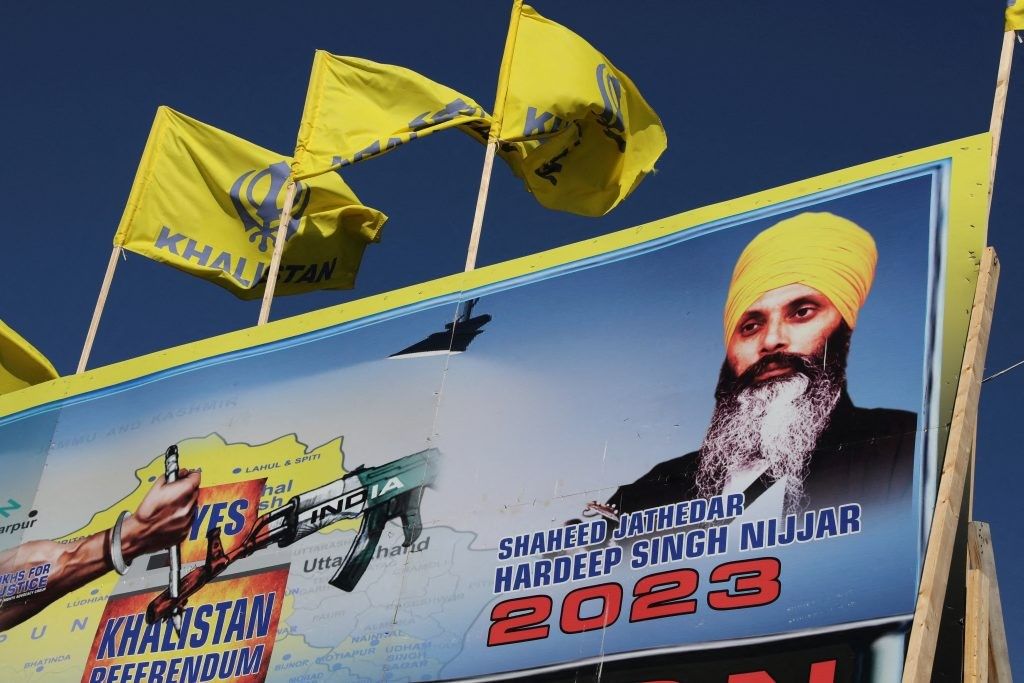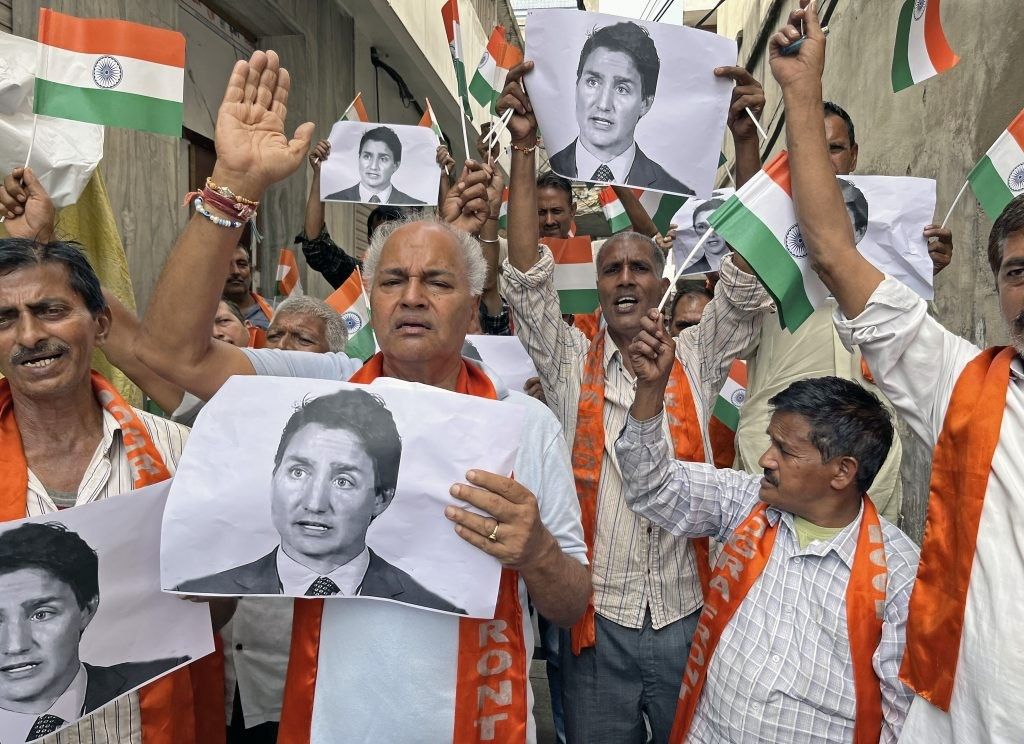CANADIAN prime minister Justin Trudeau’s accusation on Tuesday (19) that the Indian government was behind the killing of a Sikh leader in Canada led to an escalating war-of-words and diplomats being ejected from both countries.
India described as “absurd” Trudeau’s claims that “credible allegations” linked Indian agents to the June slaying of Hardeep Singh Nijjar. He was gunned down on June 18 in Surrey, a suburb of Vancouver, home to a large Sikh community.
Nijjar was accused by New Delhi of carrying out terrorist attacks in India, including being part of a plan to murder a Hindu priest in Punjab – charges he denied.
The 45-year-old was an activist campaigning for the establishment of Khalistan, an independent Sikh state to be carved out of part of northern India and perhaps part of Pakistan. He had been organising an unofficial referendum for Khalistan at the time of his death.
New Delhi insisted it had nothing to do with the killing, adding that prime minister Narendra Modi had “completely rejected” the accusation when raised privately by Trudeau. “Allegations of Government of India’s involvement in any act of violence in Canada are absurd,” the foreign ministry said in a statement.
“We are a democratic polity with a strong commitment to rule of law.”
Trudeau made the allegations public before an emergency session of parliament, calling in the “strongest possible terms” for the Indian government to cooperate in clearing up the matter.
“The involvement of any foreign government in the murder of a Canadian citizen on Canadian soil is an unacceptable violation of our sovereignty,” he said.
Trudeau later told the media that Canada would always defend “freedom of expression, freedom of conscience and freedom of peaceful protest” while acting against hatred.
Foreign minister Melanie Joly then announced the expulsion of the local head of the Research and Analysis Wing (RAW), India’s foreign intelligence agency.
India responded by summoning Canada’s High Commissioner to the foreign ministry on Tuesday before announcing a reciprocal expulsion of an unnamed top Canadian diplomat.
That decision reflected the “growing concern at the interference of Canadian diplomats in our internal matters and their involvement in anti-India activities”, the ministry said.

Khalistan (Pic credit: REUTERS/Chris Helgren)
Candida’s public safety minister Dominic LeBlanc said the country’s national security advisor and the head of Canada’s spy service had travelled to India to meet their counterparts and to confront the Indian intelligence agencies with the allegations. He called it an active homicide investigation led by the Royal Canadian Mounted Police.
Trudeau added his government has been working closely with Canada’s allies on the case, saying he had raised it with US president Joe Biden and British prime minister Rishi Sunak.
The United States and Australia expressed “deep concern” over Canada’s accusations, while Britain said it was in close touch with its Canadian partners about the “serious allegations”.
Trudeau was also supported by Canada’s opposition parties, with The New Democratic party leader, Jagmeet Singh, who is Sikh, saying there must be consequences for the assassination.
“To hear the prime minister of Canada corroborate a potential link between a murder of a Canadian citizen on Canadian soil by a foreign government is something I could never have imagined,” he said. “We will ensure that no rock is unturned, that every possible link is examined.”
The Conservative leader, Pierre Poilievre, said the allegations, if true, “represent an outrageous affront to Canada”, adding that citizens should be free from extrajudicial killings. He added: “Canadians deserve to be protected on Canadian soil. We call on the Indian government to act with utmost transparency as authorities investigate this murder, because the truth must come out.”

Canada has the largest population of Sikhs globally outside of India, and New Delhi has long been unhappy with Canada’s handling of Sikh separatist activists linked to an independent Sikh homeland in Punjab, India.
The creation of Khalistan has been sought for decades. Punjab, which is 58 per cent Sikh and 39 per cent Hindu, was rocked by a violent separatist movement in the 1980s and early 1990s, in which thousands died before it was suppressed by tough security action.
However, India has been wary of any revival, with a particular focus on small groups of Sikhs in Australia, Britain, Canada and the US, who support the separatist demand and occasionally stage protests outside its embassies.
Nijjar is the third prominent Sikh figure to have died suddenly in recent months – including one death the UK.
Avtar Singh Khanda, reportedly the head of the Khalistan Liberation Force, died in Birmingham in June.
According to the BBC, Khanda’s death occurred in what has been described as “mysterious circumstances” that some believe could be related to poisoning.
A third man, Paramjit Singh Panjwar, was shot dead in May in Lahore, the capital of Pakistan’s Punjab province.
Shruti Kapila, professor of History and Politics at the University of Cambridge, told BBC’s Today programme the campaign for Khalistan is now an issue fought for outside of India.
“It’s important to state that politics in the Indian Punjab have really moved on and that this separatist issue now seems much more extraterritorial and in places where there is a Sikh community such as in Canada,” Kapila said.
“It’s the diasporas that are seeking it rather than the Sikhs in Punjab,” the professor noted. “Indian Punjab now has a completely different set of politics and the issue longer commands either a popular, let alone, militant acceptance in the heartland.”
‘Delhi sensitive’ to handling of Sikh protests
INDIA has been particularly sensitive to Sikh protesters in Canada with some Indian analysts saying Ottawa does not stop them as Sikhs are a politically influential group there.
In June, India criticised Canada for permitting a float in a parade depicting the 1984 assassination of prime minister Indira Gandhi by her bodyguards, perceived to be glorification of violence by Sikh separatists.
Tensions between India and Canada have been simmering over the unsolved slaying of Nijjar, and Indian unhappiness over how Ottawa has handled Sikh separatists.
Jocelyn Coulon, a former adviser to Trudeau who is now an independent researcher, said Canada’s accusation would have “the effect of a bomb around the world”.
India will join “the group of nations that assassinate political opponents” abroad, much as Saudi Arabia orchestrated the murder of journalist Jamal Khashoggi in Turkey in 2018, said Coulon.
Trudeau was in New Delhi last week for the G20 summit and met Modi privately, but his visit was a testament to the strained ties between their countries. Modi did not hold a two-way meeting with Trudeau at the G20 summit, despite similar meetings with other world leaders.
Days earlier, metro stations in the Indian capital were vandalised with pro-Khalistan graffiti.
Modi expressed “strong concerns about continuing anti-India activities of extremist elements in Canada” during a meeting with Trudeau, according to an Indian government statement.
India has often complained about activities of the Sikh diaspora abroad, particularly in Canada, which New Delhi believes could revive a Sikh separatist movement.
India’s ministry of external affairs (MEA) said these “unsubstantiated” allegations seek to shift the focus from Khalistani terrorists and extremists, who have been provided “shelter in Canada and continue to threaten India’s sovereignty and territorial integrity”.
“The inaction of the Canadian Government on this matter has been a long-standing and continuing concern,” it said.
“The space given in Canada to a range of illegal activities including murders, human trafficking and organised crime is not new.
“We reject any attempts to connect the Government of India to such developments,” it said.
“We urge the Government of Canada to take prompt and effective legal action against all anti-India elements operating from their soil,” it added.
Canada recently suspended negotiations for a free-trade agreement with India.
Canadian Trade Minister Mary Ng postponed a trade mission to India planned for October. Both countries said they paused trade talks after expressing earlier in 2023 they aimed to seal an initial trade deal this year.
Bilateral commercial relations between the two countries are worth $100 billion (£80.6bn), which includes $70 bn (£56.4bn) of Canadian portfolio investment, according to Indian figures.
